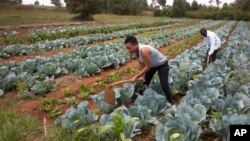The Association of Foreign Press Correspondents in the United States has partnered with PepsiCo in highlighting the benefits of regenerative agriculture, which according to experts, promotes good environmental practices that reverse climate change by preserving devastated soil biodiversity. Top scientists, researchers, journalists, agriculturalists and others are expected to attend a one-day online seminar on the benefits of regenerative agriculture.
The educational online seminar titled ‘Regenerative Agriculture: A Powerful Tool to Fight Climate Change’, comes at a time the world is grappling with the devastating effects of climate change. In a media briefing, Thanos Dimadis, executive director of the Association of Foreign Press Correspondents in USA, who will be the moderator of the event, said the seminar is designed to show the benefits of regenerative agriculture, which can be expanded worldwide for tackling climate change.
Some of the top scientists to feature at the event include Jim Andrew, executive vice president and chief sustainability officer for PepsiCo, and Dr. Abbey Wick, associate professor at North Dakota State University, who is also an extension soil health specialist and founder of Wick Consulting. An expert in regenerative agriculture, Adam Kiel, executive vice president of the Soil and Water Outcomes Fund, is expected to grace the seminar.
The event is being held at a time most countries, including Zimbabwe, are battling against the devastating effects of climate change. Agricultural specialist and chairperson of Zimbabwe’s Board of Agricultural and Rural Development Agency, Mr. Ivan Craig, says regenerative agriculture is a new farming method in Zimbabwe. He said,“Yes, regenerative agriculture is new to us as a people, but it is good for our health and highly profitable too, hence we will run with it and see what comes out of it.”
David Dung Dayi, executive director of an agro-processing firm in Central Plateau State in Nigeria, who relocated from Brazil to pursue regenerative agriculture in coffee plantations, says Africa is ready for this farming technic. David said,“I am a living story of how climate change has hit us very bad, now I know this adds economic value even to small farmers and I am a believer. I think it’s time Africa adopts this technic.”
Mrs. Maiwepi Jiti, the leader of Zimbabwe’s coalition of farmers’ representative unions, Integrated Commercial Farmers’ Union, says Zimbabwe has not been left out of regenerative agriculture. “In Zimbabwe regenerative agriculture is practiced through the conventional methods of Pfumvudza in Shona and Intwasa in Ndebele - meaning the use of organic mulch enriching the soil and conservation to mitigating climate change not only for local households, but the whole world”, said Mrs Jiti.
Research and development practitioner, Mr. Nickros Kanjengo, who helped spearhead a minimum tillage program or conservation-farming method known as Pfumvudza through the Ministry of Agriculture, says Zimbabwe’s drive is pinned on sustainable methods of farming hence the incorporation of regenerative agriculture in today’s farming systems. He said, “Guided by sustainable development goals and other global blueprints like Africa Agenda 2063, a number of strategic measures have been put in place to eradicate poverty and this is where regenerative agriculture comes in.”
Indications are that Africa is more vulnerable than any other continent in terms of climate change, fueled by global warming. Many scientists believe that regenerative agriculture will save the world from climate change.




